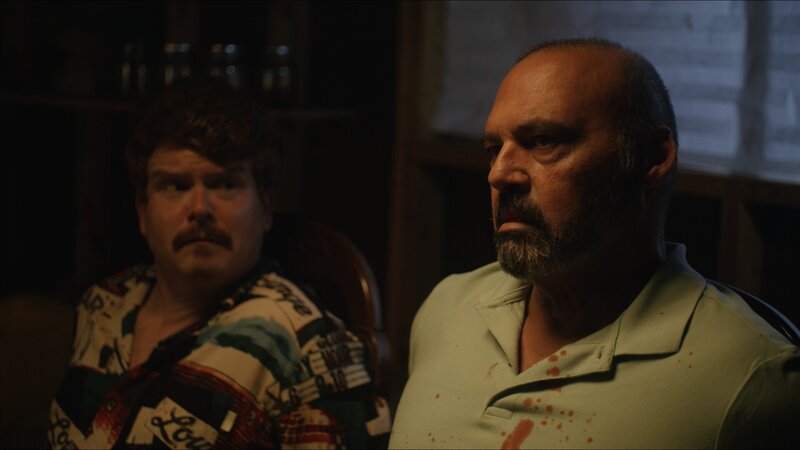
Where the Paycheck Costs More Than You Think
MOVIE REVIEW
Calamari
–
Genre: Horror, Thriller, Psychological, Dark Comedy
Year Released: 2025
Runtime: 1h 10m
Director(s): Russell Whaley
Writer(s): Presley Paras
Cast: Jerry Gureghian, Julia Stier, Oleg Bernov, Kyrena Dudley, Simon Martin
Where to Watch: available on www.filmzie.com and availability on other streamers TBA, please check out the trailer here: www.youtube.com
Follow: on Instagram @calamarimovie @russell_whaley_horror @presleyparas_ @bruce.clarke_ and on YouTube @presleyparas @russellwhaley1
RAVING REVIEW: Russell Whaley’s feature, CALAMARI, is a sharp, twisted, and surprisingly funny psychological horror film about ageism, desperation, and what it means to sell yourself just to stay alive—sometimes literally. What begins as a grounded commentary on workplace exploitation, featuring Jerry Gureghian in an incredibly powerful role, turns into a darkly comic descent into horror and psychological collapse. It blends the offbeat tone of dark comedy with the unease of a nightmare that never stops tightening its grip.
The story centers on Ronan, played with restraint and dignity by Gureghian, a middle-aged man struggling to stay afloat in a job market that has written him off. After facing rejection after rejection, he lands a position as a personal assistant that seems almost too good to be true. And like most offers that sound perfect on paper, this one comes with an unimaginable cost. The setup feels familiar—an aging John Doe desperate for a second chance—but Whaley and writer Presley Paras turn it into something far stranger and more disturbing than expected.
From its opening minutes, CALAMARI establishes an uneasy feeling, thanks in large part to the convincing warmth of Gureghian’s performance. The dialogue feels natural yet loaded, the silences stretch a second too long, the office setting—so clean and ordinary—feels increasingly alien. Whaley’s direction embraces stillness and negative space, allowing discomfort to bloom within the frame. There’s a disarming simplicity to how the story unfolds, and that restraint makes every reveal hit harder. When the film eventually tips into horror, it does so with a mix of humor and dread that feels inspired by both MISERY and DOGTOOTH, two films the director cites as tonal influences.
What’s most impressive is how confidently CALAMARI straddles those genres. It’s simultaneously a dark satire of workplace culture, a psychological breakdown, and a grotesque parable about the commodification of human worth. The film’s low budget becomes part of its character—its contained setting, limited cast, and small-scale production enhance the claustrophobic mood rather than limit it. Whaley doesn’t hide his constraints; he weaponizes them. Each long take draws attention to Ronan’s isolation. At the same time, the muted lighting and sterile décor evoke both the monotony of office life and the creeping sense of something inhuman beneath it.
Julia Stier’s Danielle is the film’s secret weapon. She commands every scene with a disarming mix of charm and control, her polished exterior slowly giving way to menace. Her dynamic with Gureghian drives much of the tension—what begins as an uneasy professional relationship solidifies into something closer to psychological warfare. There’s no need for overt villain monologues; her manipulation is far scarier. Opposite her, Gureghian’s performance is grounded and heartbreaking. His Ronan is a man clinging to pride while drowning in humiliation, and his gradual unraveling feels both tragic and inevitable.
The supporting cast adds without diluting the focus. Oleg Bernov, as the enigmatic Keer, brings a physical intensity that injects the film with a sense of danger whenever he appears. Kyrena Dudley and Simon Martin fill out the world with just enough humanity to make the cruelty of Ronan’s situation feel plausible. The balance between absurdity and realism is razor-thin, but it’s maintained with precision.
When CALAMARI reaches its horror crescendo, it doesn’t rely on jump scares or cheap shocks. The violence is more psychological than visual, and when the film does indulge in body horror, it’s brief, meaningful, and deeply unsettling. The elements serve as a metaphor rather than a spectacle—an external manifestation of what’s being done to Ronan spiritually. It’s horror as degradation, the kind that sticks not because of what you see, but because of what it represents.
Whaley’s approach to tone is particularly effective. There’s an undercurrent of absurdist humor that never feels out of place. Even in its most horrifying moments, the film remains aware of its own irony. The workplace, the faux professionalism, the hollow chatter—all of it becomes a dark punchline. CALAMARI understands that the systems that chew people up and spit them out are already absurd; the horror lies in realizing how normal they’ve become.
The last act arrives abruptly, and while it doesn’t overstay its welcome, the climax could have used a touch more breathing room to land with full impact. The ending is deliberately ambiguous—less a conclusion than an exhalation—but that works with Whaley’s thematic goals. The point isn’t how it ends, but that it ends the only way it ever could. In a world that commodifies people, the outcome for someone like Ronan was written before he even applied.
By the time the credits roll, CALAMARI has delivered a story that’s both literal and allegorical, making its commentary on ageism hit with the subtle force of inevitability. The “trophy” Ronan becomes isn’t just a plot device; it’s a symbol for every person who’s been devalued and discarded once society decided they’d aged out of relevance. Whaley described wanting something “weird and wonderful,” and that’s exactly what he’s made. CALAMARI is a smart, quietly vicious film that proves you don’t need big effects or endless exposition to disturb an audience—you just need the truth, sharpened and served cold. It’s a bold, unnerving entry in the psychological horror space that uses dark comedy as its secret weapon and never forgets that the scariest monsters wear the friendliest faces.
Please visit https://linktr.ee/overlyhonestr for more reviews.
You can follow me on Letterboxd, Instagram, Twitter, and YouTube. My social media accounts can also be found on most platforms by searching for 'Overly Honest Reviews'.
I’m always happy to hear from my readers; please don't hesitate to say hello or send me any questions about movies.
[photo courtesy of WILD RUFFIAN, DOOFOLO PICTURES]
DISCLAIMER:
At Overly Honest Movie Reviews, we value honesty and transparency. Occasionally, we receive complimentary items for review, including DVDs, Blu-rays, CDs, Vinyl Records, Books, and more. We assure you that these arrangements do not influence our reviews, as we are committed to providing unbiased and sincere evaluations. We aim to help you make informed entertainment choices regardless of our relationship with distributors or producers.
Amazon Affiliate Links:
Additionally, this site contains Amazon affiliate links. If you purchase through these links, we may receive a commission. This affiliate arrangement does not affect our commitment to honest reviews and helps support our site. We appreciate your trust and support in navigating these links.



Average Rating